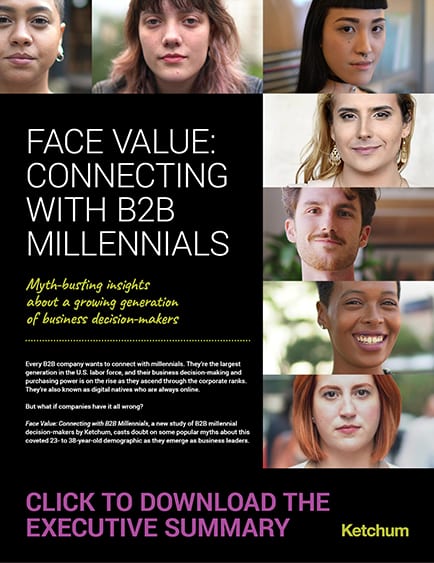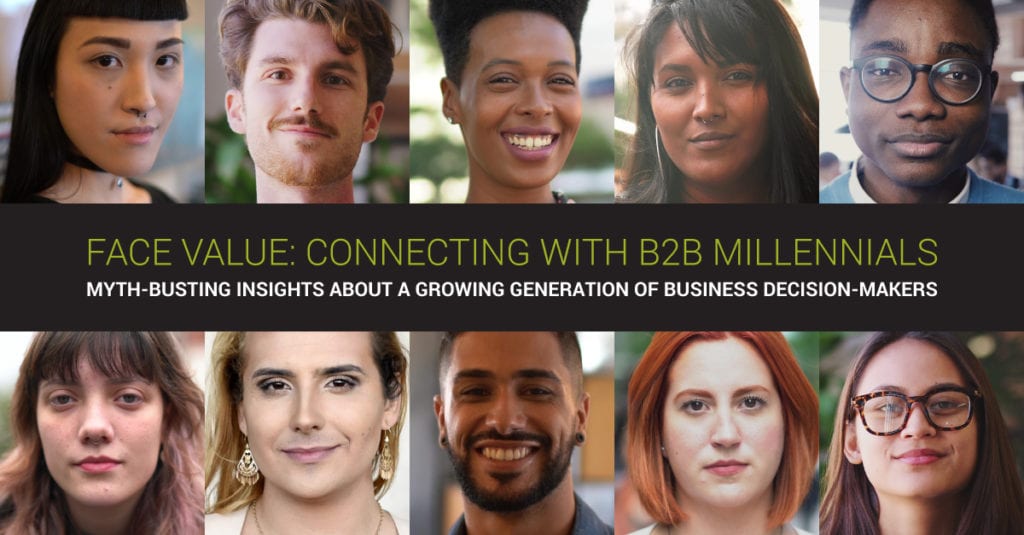Marketers have studied and analyzed millennials as consumers extensively. But have we really researched millennials as major decision-makers inside companies, specifically as B2B purchasers?
Many professionals in this generation have moved from FOMO (fear of missing out) to JOMO – the joy of missing out. And they are grappling with technology overload. In her now-famous Buzzfeed article, “How Millennials Became the Burnout Generation,” writer Anne Helen Petersen tackled the topic and calls it “the contemporary condition” of this demographic. For a generation that often wakes up with their smart phone on their pillow, checking messages before getting out of bed, dream jobs can turn anxiety prone. Are B2B marketers making it worse? Has too much of business communications taken the human out of the equation in the name of efficiency, ROI and tracking systems?
As Ketchum’s Face Value: Connecting with B2B Millennials study of these emerging decision-makers confirms, many myths about millennials are destructive and really out of touch with how this generation does business.
Consider the following facts about B2B millennial decision-makers that were uncovered by the Face Value survey:
- They work like crazy. About 40% of millennials in B2B decision-making roles spend five hours or more looking at work-related content outside of working hours. They are completely overloaded. Is your AI-driven content helping or hurting them? Is your marketing making it easier or harder for them to keep up? Are you exhausting them? Are you destroying their dream jobs?
- They want to meet you. Almost 2/3 (61%) would prefer to conduct new business meetings face-to-face; and 76% would prefer to build a personal relationship with a vendor or partner. They are craving in-person contact, not digital isolation. Have you reduced high contact from your marketing budget? Are you trying new innovative ways to reach them personally? Or are you looking at them as numbers on a spreadsheet?
- They like “purpose,” but … About half (49%) think it’s very important to work with a company that has a strong social purpose. But that means about half don’t. Even more striking, purpose is far less important to them when making a business decision than price (76% prioritize cost) and performance (81% value reliable service), items that can be measured and will help them get rewarded in their jobs. Are you focused on their needs first – their own professional development? Are you focused on them before you focus on purpose?
There are plenty more stats from the survey, but you get the point. While analytics-fueled digital marketing channels are important, you need to set aside some time and resources for more traditional tactics, too. Don’t underestimate dinners and coffee dates, interactions at trade shows and old-fashioned pressing the flesh. As for digital content, the more it is customized to their needs and helps them grow professionally versus just focused on product attributes, the more ROI it will create.
These findings were among the stereotype-defying, myth-busting insights gleaned from Ketchum’s recent online survey of 1,001 B2B decision-makers in the 23- to 38-year-old age group. Our hope was that we would learn more about the on-the-job preferences and needs of this group, which is gaining ever more prominence in the business world, so our clients could better tailor their outreach to them.
 In my opinion, while millennials are true digital natives who value online and social media interactions as they go about their lives, they are humans, not robots. They still require that human touch, especially when conducting business. And the assumptions we make about them as consumers aren’t necessarily the assumptions we should make about them as business people.
In my opinion, while millennials are true digital natives who value online and social media interactions as they go about their lives, they are humans, not robots. They still require that human touch, especially when conducting business. And the assumptions we make about them as consumers aren’t necessarily the assumptions we should make about them as business people.
Does this mean it’s time to scuttle the digital assets and data-driven capabilities and purpose-driven CSR programs that B2B companies are increasingly emphasizing in their outreach to millennials? No. They are incredibly useful resources for targeting and reaching the right B2B audiences for your products and services.
But we must see them for what they are: tools that are most effective once a strong, personal relationship has been established, and maintained, with prospects or clients.
As Ketchum and our clients have learned, B2B is not B2C marketing with a different name. It requires a highly-nuanced communications approach that targets not only decision-makers but a wide, critical ecosystem of influencers and other stakeholders involved in the buying process.
We’d love to help you map out and navigate your own B2B journey. Let’s talk … in person!
1 Ketchum’s Analytics specialty polled 1,001 current full-time U.S. employees with decision-making and purchasing power, ages 23 to 38. Conducted between Sept. 4, 2019 and Sept. 13, 2019, the survey has a margin of error of +/- 3 at a 95% confidence level.



